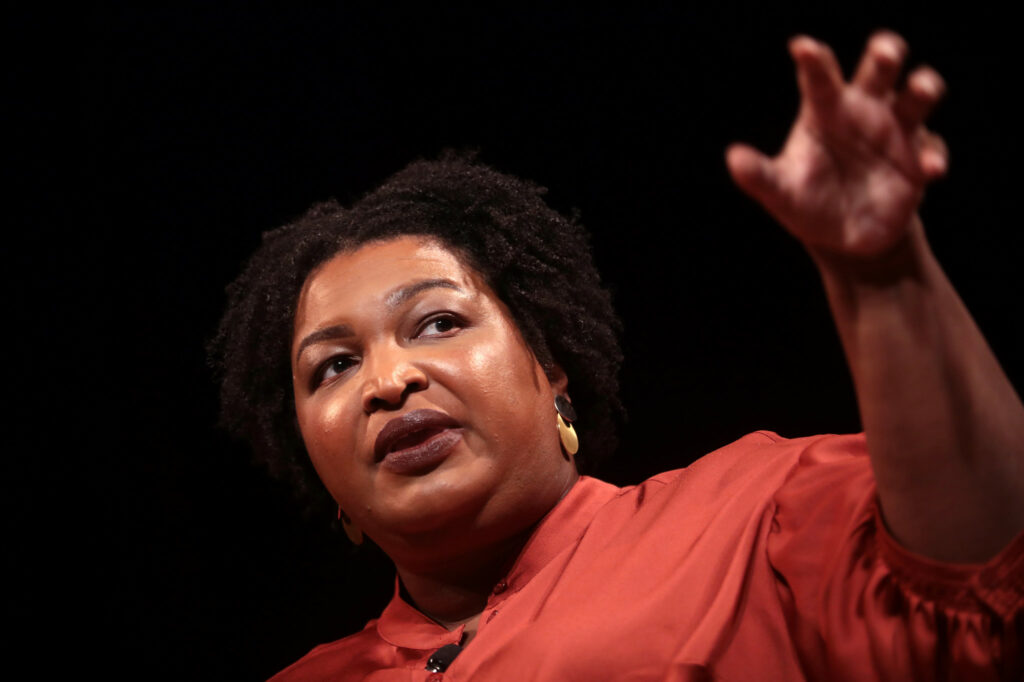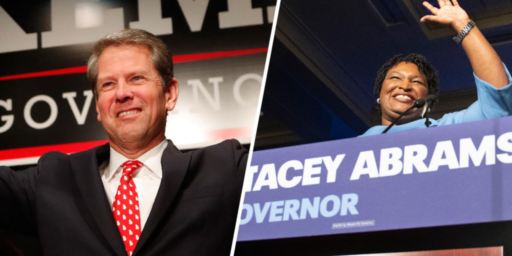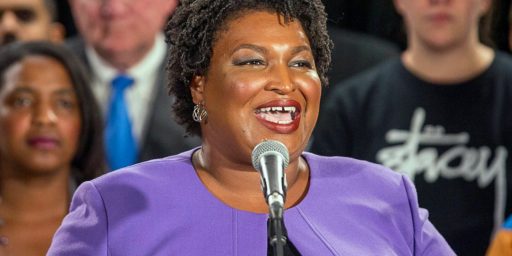Revisiting Stacey Abrams’ Nonconcession
Assessing her actions in 2018 in light of 2020 and onward.

Given Stacey Abrams’ pending campaign for governor of Georgia, I suspect that we are going to be hearing a lot about the fact that she did not concede her 2018 loss to Brian Kemp. There will be a lot of comparisons to the way that Donald Trump treated his 2020 defeat. For example, a piece in November of 2020 at NPR played the bothsiderism game that I expect will be prominent soon: Trump Hasn’t Conceded Georgia. Neither Did Stacey Abrams. What Changed?
A refusal to concede isn’t a new concept to Georgia. The 2018 Democratic candidate for governor, Stacey Abrams, also refused to concede to her Republican opponent, Brian Kemp.
Abrams had stayed quiet for 10 days after the election while her campaign focused on getting more absentee and provisional ballots counted. Then she called a press conference at which she made a careful statement: “I acknowledge that former Secretary of State Brian Kemp will be certified as the victor in the 2018 gubernatorial election.”
However, she declared, this was “not a speech of concession.”
This is a great example, I think of bending over backward to try and appear fair and in so doing engaging in massive bothersidism.
I mean, yes, Trump never conceded Georgia and Abrams expressly said that she was not making a concession speech. So, on very narrow ground, that both didn’t concede. But there is a massive difference between Trump’s actions in regards to Georgia (and, indeed, a number of states) in 2020 and what Abrams did two years prior. Abrams may not have conceded, but she acknowledged Kemp’s victory.
Let’s stop there and focus.
She did not give a “concession speech”–which is a wholly symbolic act. In the public mind, however, “conceding” is the acknowledgment of loss and the acceptance of one’s opponent’s victory.
And Abrams did, in fact, accept his electoral victory.
Trump has never acknowledged Biden’s win.
Further, Abrams expressly eschewed (see below) the notion of a never-ending fight to win the office via the courts, while Trump tried dozens and dozens of attempts and his allies tried everything from attempting to disrupt the counting of the Electoral Votes to bogus audits of states that had already been certified after sometimes multiple recounts.
Trump claimed (and continues to claim) that the election was stolen. He and his allies lie about the election constantly.
Moreover, he wanted his Vice President to reject legally cast electoral votes.
Trump sought to illegally remain president and to subvert American democracy.
What did Abrams do?
Well, Abrams asserted that the Secretary of State, who oversaw the electoral process in Georgia, aggressively used his powers to purge voter rolls and to make it difficult for Georgians to vote, especially Georgians of color.
American Public Media reported an analysis of these actions in 2019:
On a single day in late July 2017, Kemp’s office had removed from the rolls 560,000 Georgians who had been flagged because they’d skipped one too many elections. Abrams would later call the purge the “use-it-or-lose-it scheme.” An APM Reports investigation last year estimated 107,000 of the people purged under the policy would otherwise have been eligible to vote last year
Oh, and the Secretary of State in question was the candidate running against Abrams for governor (see James Joyner’s post at the time: Brian Kemp Rigging His Own Election).
While the argument was made that the goal was to simply clean up the voter rosters, let’s consider who would be likely to be affected by such a move.
Kemp and Abrams were adversaries over voting rights, and, in the campaign, they came to personify the debate between election security and access. In 2014, Kemp called for a criminal probe of registrations collected through the New Georgia Project, a nonprofit formed by Abrams, whose primary mission was to register new voters, particularly young adults and people of color.
Then, in July 2017, Kemp’s office removed 560,000 people from the voter rolls for infrequent voting. His office portrayed the purge as innocuous voter list maintenance, which secretaries of state regularly perform the year before an election. But the number of voters purged was unusually high. Some Democrats accused Kemp of trying to manipulate the electorate ahead of his run for governor.
[…]
the 2017 purge likely gave an advantage to Kemp and other Republican candidates, an analysis of election results and state voter files shows. Purged voters were more likely to live in Democratic precincts, an APM Reports analysis found. Specifically, the data shows that, of the purged registrations that could be matched up to precincts, nearly 47 percent were from precincts that Abrams carried by more than 10 percentage points last November. (Those precincts made up just about 39 percent of overall votes.) Meanwhile, voters in strong Kemp precincts were under-represented on the purge list. Registrations from those heavily Republican precincts accounted for more than 43 percent of the purges. Such precincts made up over 51 percent of votes.
To borrow Brandon Nyhan’s Twitter bit: what would you think if you saw that in another country?
Or, to put it another way: is such a move likely to increase voter access on election day or diminish it?
(The answer is, for anyone wondering: diminish it).
It is worth noting that Kemp’s margin of victory over Abrams in 2018 was 54,723 votes. It is therefore not surprising that Abrams believes that Kemp’s actions as SoS might well have shaped the outcome of the election (although it is unlikely that those 107,000 voters would have all voted had they not been purged–still, best to let people make their own choices than to make them for them).
Back to Abrams v. Trump:
Trump asked Kemp to find votes in 2020 (and, to Kemp’s credit, he did not take up that request). Trump solicited other officials in other states as well.
While Trump asked for votes to be fabricated, Abrams asked for voting to be easier.
The contrast here should be stark and obvious, and should undercut simplistic claims like “well, neither conceded, so both sides, dontcha know.”
There is no moral equivalence.
Let’s look at what she actually said in her non-concession speech (her prepared remarks can be found here):
I acknowledge that former Secretary of State Brian Kemp will be certified as the victor in the 2018 gubernatorial election.
But to watch an elected official – who claims to represent the people of this state, baldly pin his hopes for election on the suppression of the people’s democratic right to vote – has been truly appalling. So, to be clear, this is not a speech of concession.
Concession means to acknowledge an action is right, true or proper. As a woman of conscience and faith, I cannot concede. But my assessment is that the law currently allows no further viable remedy.
Now, I could certainly bring a new case to keep this one contest alive, but I don’t want to hold public office if I need to scheme my way into the post. Because the title of Governor isn’t nearly as important as our shared title. Voters.
Another contrast with Trump:
And I will pray for the success of Brian Kemp, that he will indeed be a leader for all Georgians.
Meanwhile, compare that to Trump who told insurrectionists that he loved them.
And, of course, there is this Atlantic piece the details not only the way many of Trump’s followers view the 2020 election (i.e., who have swallowed the narrative that Trump has put forth) but the legal and political mechanisms in place that could lead to a 2024 outcome that is counter-democratic: Trump’s Next Coup has Already Begun.
Look, I understand how, on the surface, any assertion of electoral shennigans undercuts public trust in democracy, and that has consequences. But calling attention to legitimately questionable behavior, which is what Abrams did, is in a different universe from making boldly false claims about the electoral outcomes in mutliple states.
Indeed, we need truly questionable behavior to be called out. What we don’t need is for lies to be told about fraud that didn’t happen.
It actually is a problem for the Secretary of State (i.e., the official in charge of elections) to be a candidate for office and be in a position to make decisions that could influence outcomes. It is a classic, clear, and obvious conflict of interest.
Moreover, the bottom line is this: Abrams is asking for better access for voters to vote, while Kemp actively made it harder for some voters to vote. So, what she was calling out was both real, and her position had the moral high ground.
Indeed, here’s an idea: how about we let it be as easy as possible for citizens to vote and then whoever wins the most votes wins office?
One can criticize Abrams for what she said and/or how she said it (atlthough I don’t think that criticism is justified). Still, there is zero moral equivlance between what she said and what Trump has said. Zero.
The worst of Abrams, if one wished to be critical, would be things like this from 2019 in an interview with the New York Times Magazine with the somewhat provocative title: Why Stacey Abrams is still saying she won.
I saw that recently you said something like you’d won your election but you just didn’t get to have the job. Yes.
Is there any fear on your part that using that kind of language fans the same flames that President Trump has fanned about delegitimizing our elections? I see those as very different. Trump is alleging voter fraud, which suggests that people were trying to vote more than once. Trump offers no empirical evidence to meet his claims. I make my claims based on empirical evidence, on a demonstrated pattern of behavior that began with the fact that the person I was dealing with was running the election. If you look at my immediate reaction after the election, I refused to concede.6 It was largely because I could not prove what had happened, but I knew from the calls that we got that something happened. Now, I cannot say that everybody who tried to cast a ballot would’ve voted for me, but if you look at the totality of the information, it is sufficient to demonstrate that so many people were disenfranchised and disengaged by the very act of the person who won the election that I feel comfortable now saying, “I won.” My larger point is, look, I won because we transformed the electorate, we turned out people who had never voted, we outmatched every Democrat in Georgia history. But voter suppression is endemic, and it’s having a corrosive effect. If we do not resolve this problem, it will harm us all.)
(6 After her attempts to force a runoff fell short, Abrams ended her campaign for governor with a speech in which she said, ”So let’s be clear — this is not a speech of concession, because concession means to acknowledge an action is right, true or proper.” She added, ”Democracy failed Georgians.”)
It’s one thing to say you lost that election unfairly, and it’s another to say you won because you increased voter turnout. But can you clarify for me exactly what you’re implying when you say you “won” that election? There are three things: No. 1, I legally acknowledge that Brian Kemp secured a sufficient number of votes under our existing system to become the governor of Georgia. I do not concede that the process was proper, nor do I condone that process. No. 2, I believe we won in that we transformed the electorate and achieved a dramatic increase in turnout. It was a systemic and, I think, sustainable change in the composition of the electorate and in the transformation of the narrative about Georgia and Georgia politics. Three, I have no empirical evidence that I would have achieved a higher number of votes. However, I have sufficient and I think legally sufficient doubt about the process to say that it was not a fair election.
Fundamentally it is true that both Abrams and Trump have contributed to concern about the quality of American democracy, but in qualitatively and morally different ways. Abrams is pointing out real problems that need solving and her goals are to increase access to the ballot box and to increase voter turnout. She wants to make voting easier. Trump and his ilk, conversely, want to increase their odds of winning officer by suppressing votes and by lying to millions of people.
So while there are some superficial and simplistic ways that these sides can be said to be doing the same thing, the reality is that they are worlds apart in both the factual basis of their positions, but more significantly in their goals.
My goal here is not to beatify Abrams; it is to plainly delineate the chasm that exists between behavior that have been, and will be, treated as somehow equivalant. A reader may not like her style or want her to be governor of Georgia. That is all well and good, but that does not obviate the differences between the two narratives (and goals) on display in a comparison between these two individuals.




Well TFG is pointing out a real problem, but it is pretty close to home. He’s no longer prez and can’t utilize the the greatest graft machine known to man.
Good analysis.
Good post. This is an ugly reminder of just how ridiculous it was that the SOS was overseeing his own election. There are no longer norms or fundamentals of right and wrong for these people.
While it may not be your goal to beatify Stacey Abrams, would it be okay if I went that far?
To my mind as a pro-democracy single issue voter, an Abrams win in Georgia 2022 will do more to reverse course on the anti-democracy trend in this country than any other race by far. She is taking on corrupted politics by transforming the electorate and increasing turnout. If she wins the GA governorship, she will have beaten anti-majoritarianism with people power.
Not only does the lazy bothsiderism on her need to be beaten down hard, she also needs our financial support and volunteer time.
I’d like to know how many attempted to vote and were either turned away at the polls (or denied an absentee ballot), or given a provisional ballot that was ultimately never counted.
We will probably never know the former, but the latter should be measurable, and give us an idea of the scale of the impact.
I expect it is far lower than the number of people who gave up because of incredibly long lines, but that is another unknowable number.
Coincidentally, the people making that equivalence have zero morals.
Let’s put it this way:
The firefighters pouring tons of water on a burning building are not equally responsible for damage with the arsonist who set the fire.
If TFG won the 2020 election, doesn’t that make him illegible in the 2024 election per the 22nd amendment? Doesn’t he have to admit he lost in 2020 to be eligible in 2024?
“No person shall be elected to the office of the President more than twice…”
Hillary had a stronger grievance than Trump and Abrams. Yet she issued a classy concession the very next morning. And gets no credit for it.
I hope history will give Hillary Cassandra Clinton the laurels and plaudits she has not received in life.